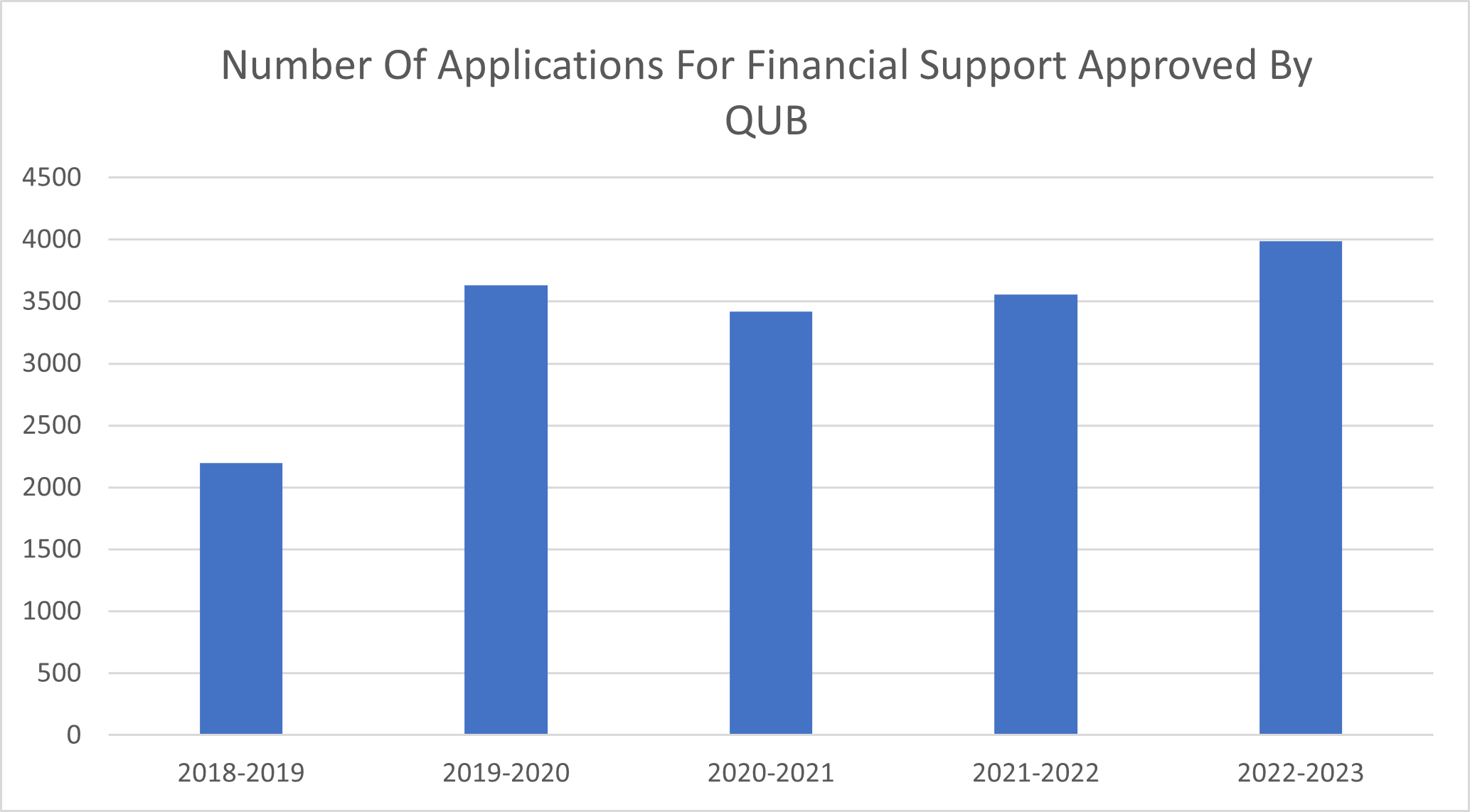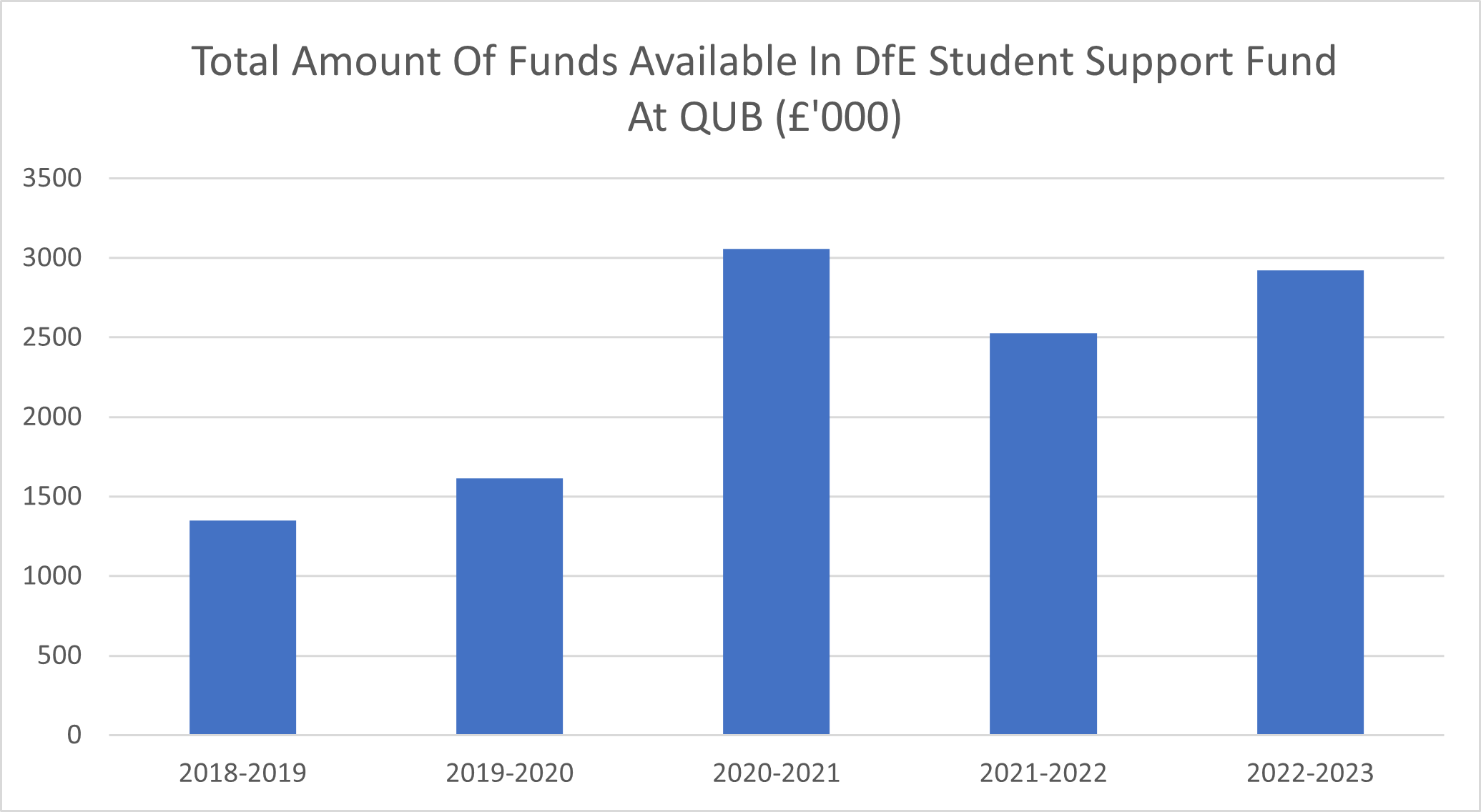Number of approved student applications for financial support at QUB almost doubles in five years
Kirsty King
The number of approved student applications for financial support at Queen’s University Belfast almost doubled between 2018-19 and 2022-23.
Data obtained through a Freedom of Information Request reveals that in the 2022-23 academic year 3989 applications for the University’s Financial Assistance Fund and the Department for the Economy (DfE) Student Support Fund were approved, an 81 per cent increase on the 2195 applications approved during the 2018-19 academic year.
The 2022-23 academic year saw 3936 students make one or more applications for financial support, the greatest number over the five-year period. The same year also saw the greatest number of denied applications over the period at 1224.
The data obtained also reveals the total amount of funds available per year in the University’s DfE Student Support Fund. In 2022-23 an amount of £2921 was available, more than doubling the £1351 available in 2018-19. During the 2020-21 academic year - at the height of the Covid-19 pandemic - £3058 was available.
A spokesperson for Queen’s University has said “Since the Covid pandemic and more recently there have been significant increases in the cost-of-living funding available, both from the Department for the Economy and the University to support students experiencing financial hardship.”
“To ensure students were aware of the financial support available, there has been significant effort dedicated to promoting the Student Support Fund and University Financial Assistance Fund.“
“As a result of this, there is greater awareness of the support available amongst the student population, which has also led to an increase in applications since 2020-21.”
For representatives of the student body, the figures are a cause for concern. Jess Hindley, Welfare Officer at Queen’s Students’ Union, says it’s “concerning but not surprising” to see the increase in applications for financial support from the University, and it’s the “stark reality” of being a student today during the ongoing cost-of-living crisis.
Data collected during the Students’ Union’s ‘Warm Up With Us’ campaign this year showed that the cost of food was one of the biggest challenges faced by students, and outlined that food, including healthy options, was the thing they were cutting back most on as a result of the cost-of-living crisis.
“This is why as a Union we are trying to offer as many additional interventions as we possibly can”, Jess says.
“This year we secured additional funding from the University to continue The SU Pantry - a free refill station where students can get essential dry foods and household items - which has been visited over 15,000 times this year.”
“We also provided over 10,000 free hot breakfasts and lunches in partnership with the University during January and February and did a similar initiative during the exam period to provide students with free lunches to try and alleviate the pressure many will feel during assessment period.”
But according to Jess, these interventions can only go so far.
“With the cost of fuel, housing and food continuing to rise, the top priority across the local student movement is to lobby the Executive for a more robust strategy to support students during this time.”
“It shouldn’t fall to individual Universities and Unions to ensure students have the support they so desperately need – this is a national problem that needs to be addressed at a national level.”
The Department for the Economy provides Queen’s University, Ulster University, The Open University, St Mary’s University College and Stranmillis University College with funding to be distributed to students “who find themselves in financial hardship and who without additional financial support, might not be able to complete their courses.”
A spokesperson for the Department has said “As a result of increased applications to the Support Funds, further funding was allocated in 2022 to alleviate pressure on the scheme and directly benefit a greater number of students who were facing financial difficulties.”
“In the financial year 2022-23, in response to the cost-of-living crisis and its impact on students and their ability to afford the rising costs of living, the Department allocated just over £6.27 million to the Support Funds.”
Kirsty King is an MA Journalism student at Ulster University


